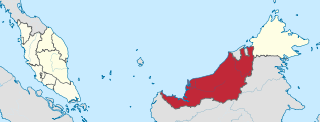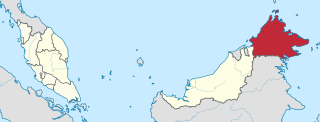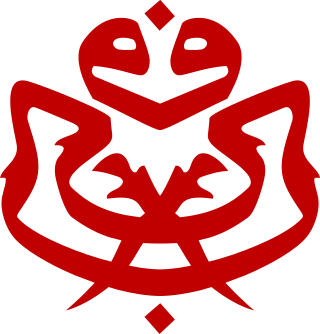
Sarawak is a state of Malaysia. The largest among the 13 states, with an area almost equal to that of Peninsular Malaysia, Sarawak is located in East Malaysia in northwest Borneo, and is bordered by the Malaysian state of Sabah to the northeast, Kalimantan to the south, and Brunei in the north. The state capital, Kuching, is the largest city in Sarawak, the economic centre of the state, and the seat of the Sarawak state government. Other cities and towns in Sarawak include Miri, Sibu, and Bintulu. As of the 2020 Malaysia census, the population of Sarawak was 2.453 million. Sarawak has an equatorial climate with tropical rainforests and abundant animal and plant species. It has several prominent cave systems at Gunung Mulu National Park. Rajang River is the longest river in Malaysia; Bakun Dam, one of the largest dams in Southeast Asia, is located on one of its tributaries, the Balui River. Mount Murud is the highest point in the state. Sarawak is the only state of Malaysia with a Christian majority.

Sabah is a state of Malaysia located in northern Borneo, in the region of East Malaysia. Sabah has land borders with the Malaysian state of Sarawak to the southwest and Indonesia's North Kalimantan province to the south. The Federal Territory of Labuan is an island just off Sabah's west coast. Sabah shares maritime borders with Vietnam to the west and the Philippines to the north and east. Kota Kinabalu is the state capital and the economic centre of the state, and the seat of the Sabah State government. Other major towns in Sabah include Sandakan and Tawau. The 2020 census recorded a population of 3,418,785 in the state. It has an equatorial climate with tropical rainforests, abundant with animal and plant species. The state has long mountain ranges on the west side which forms part of the Crocker Range National Park. Kinabatangan River, the second longest river in Malaysia runs through Sabah. The highest point of Sabah, Mount Kinabalu is also the highest point of Malaysia.

East Malaysia, or the Borneo States, also known as Malaysian Borneo, is the part of Malaysia on and near the island of Borneo, the world's third-largest island. East Malaysia comprises the states of Sabah, Sarawak, and the Federal Territory of Labuan. The small independent nation of Brunei comprises two enclaves in Sarawak. To the south and southeast is the Indonesian portion of Borneo, Kalimantan. East Malaysia lies to the east of Peninsular Malaysia, the part of the country on the Malay Peninsula. The two are separated by the South China Sea.

The National Front is a political coalition of Malaysia that was founded in 1973 as a coalition of centre-right and right-wing political parties to succeed the Alliance Party. It is the third largest political coalition with 30 seats in the Dewan Rakyat after Pakatan Harapan (PH) with 82 seats and Perikatan Nasional (PN) with 74 seats.

The United Malays National Organisation or less commonly PEKEMBAR), is a nationalist right-wing political party in Malaysia. As the oldest national political party within Malaysia, UMNO has been known as Malaysia's "Grand Old Party".

The Democratic Action Party is a centre-left social democratic political party in Malaysia. As one of four component parties of the Pakatan Harapan (PH) coalition, it formed the federal government after defeating Barisan Nasional (BN) in the 2018 Malaysian general election, ending the party's 53 year-long stay in the opposition. However, before the coalition finished its first term, defections from partnering parties caused it to lose power after 22 months, culminating in the 2020 Malaysian political crisis. At the 2022 Malaysian general election, the PH coalition which the DAP was part of was returned to power again, albeit without a majority, leading it to form a unity government with political rivals. It is one of the four component parties of the Pakatan Harapan ruling coalition in Malaysia.

Malaysian Chinese, Chinese Malaysians, or Sino-Malaysians are Malaysian citizens of Han Chinese ethnicity. They form the second-largest ethnic group in Malaysia, after the Malay majority, and constitute 22.4% of the Malaysian total population. Today, Malaysian Chinese form the second largest community of Overseas Chinese in the world, after the Thai Chinese. Malaysian Chinese maintain a significant and substantial presence in the business sector of the Malaysian economy.

The Liberal Democratic Party or well known as Liberal Democratic Party of Sabah is a Sabahan Chinese-based political party founded in the town of Tawau, Sabah, Malaysia by Hiew Min Kong in 1989. This party is a major component of Gabungan Rakyat Sabah (GRS) since April 2023.

Malaysia is a country in Southeast Asia. A federal constitutional monarchy, it consists of 13 states and three federal territories, separated by the South China Sea into two regions: Peninsular Malaysia and Borneo's East Malaysia. Peninsular Malaysia shares a land and maritime border with Thailand and maritime borders with Singapore, Vietnam, and Indonesia. East Malaysia shares land and maritime borders with Brunei and Indonesia, as well as a maritime border with the Philippines and Vietnam. Kuala Lumpur is the national capital, the country's largest city, and the seat of the legislative branch of the federal government. Putrajaya is the administrative centre, which represents the seat of both the executive branch and the judicial branch of the federal government. With a population of over 34 million, the country is the world's 43rd-most populous country. Malaysia is tropical and is one of 17 megadiverse countries; it is home to numerous endemic species. Tanjung Piai in the Malaysian state of Johor is the southernmost point of continental Eurasia.

Datu Mustapha bin Datu Harun, or Tun Mustapha for short, was a Malaysian politician who served as the 3rd Chief Minister of Sabah from May 1967 to November 1975 and the 1st Yang Di-Pertua Negara from September 1963 to September 1965 and President of the United Sabah National Organisation (USNO). He was an important party in the negotiations leading to the formation of Malaysia on 16 September 1963.
The United Sabah National Organisation was a political party in North Borneo and later Sabah, Malaysia. The widely known Sabah's Muslim indigenous especially Suluk-Bajau ethnic based party was founded by the third Chief Minister of Sabah; Mustapha Harun in December 1961.

The Alliance Party was a political coalition in Malaysia. The Alliance Party, whose membership comprised United Malays National Organisation (UMNO), Malaysian Chinese Association (MCA) and Malaysian Indian Congress (MIC), was formally registered as a political organisation on 30 October 1957. It was the ruling coalition of Malaya from 1957 to 1963, and Malaysia from 1963 to 1973. The coalition became the Barisan Nasional in 1973.

The United Pasokmomogun Kadazan Organisation was a Kadazan-Dusun-Murut (KDM) based political party in North Borneo and later Sabah at the time it became a state of Malaysia in the 1960s.

The Sabah Chinese Association was a Chinese political party in the North Borneo and the Sabah state of Malaysia.
The Sabah Democratic Party was a political party based in Sabah, Malaysia. It was an ethnically-based party striving to voice the rights and advance the development of Kadazan-Dusun-Murut (KDM) populations of Sabah and the Orang Asli of Peninsular Malaysia.
The Sabah People's Party or Malay: Parti Rakyat Sabah (PRS) is a minor party which was formed in 1989 by Sabah People's United Front (BERJAYA) leader James Peter Ongkili in an effort to woo Sabah voters from both BERJAYA and United Sabah Party (PBS) in the general elections.

Sabah People's Hope Party is a Sabah-based party located in Tawau city, founded by Lajim Ukin and Liew Yun Fah. Its ideology is based on Sabah regionalism which supports Sabah state administration by local-based parties and to reduce the control of peninsula-based parties over the state, such as Barisan Nasional, Pakatan Harapan and Perikatan Nasional.

Sabah is the third most populous state in Malaysia, with a population of 3,418,785 according to the 2020 Malaysian census. It also has the highest non-citizen population, at 810,443. Although Malaysia is one of the least densely populated countries in Asia, Sabah is particularly sparsely populated. Most of the population is concentrated along coastal areas, with towns and urban centres seeing the most population growth.
United Pasok Momogun Organisation is an ethnically-based political party in North Borneo. It was a splinter party of United National Kadazan Organisation (UNKO); founded by Donald Stephens earlier in 1961. The breakaway UPMO formed by Orang Kaya Kaya (OKK) Datuk G.S. Sundang, in January 1962 to fight for the interest of Kadazan-Dusun-Murut (KDM) races; with the supports and encouragement of the Chinese in Sabah. The split was in reaction and protest to the suggestion of the Prime Minister of Malaya, Tunku Abdul Rahman to create a new federation country named Malaysia, dubbed Projek Malaysia.















